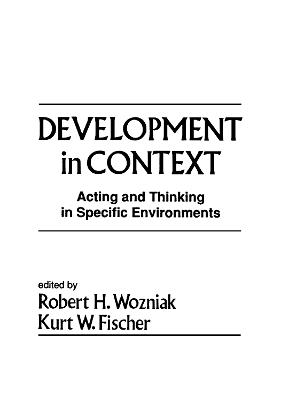
Development in Context
Psychology Press (Verlag)
978-0-8058-0769-1 (ISBN)
Analyses of the ecology and the dynamics of behavior have become popular, emphasizing the particulars of people acting in specific environments and the many complex factors of human body and mind that contribute to action and thought. This volume brings together many of the current efforts to deal with development in this richly ecological, dynamic way.
The research reported demonstrates that recent years have produced major shifts in approach. Activities are studied as they naturally occur in everyday contexts. Children's active construction of the world around them is treated as fundamentally social in nature, occurring in families, with peers, and in cultures. Behavior is studied not as something disembodied but within a rich matrix of body, emotion, belief, value, and physical world. Behavior is analyzed as changing dynamically, not only over seconds and minutes, but over hours, days, and years.
Kurt W. Fischer, Robert H. Wozniak
Contents: R.H. Wozniak, K.W. Fischer, Development in Context: An Introduction. Part I:Ecosystems, Affordances, Transactions, and Skills: Theories of Person/Situation Interaction.U. Bronfenbrenner, The Ecology of Cognitive Development: Research Models and Fugitive Findings. E.S. Reed, The Intention to Use a Specific Affordance: A Conceptual Framework for Psychology. R.H. Wozniak, Co-Constructive Metatheory for Psychology: Implications for an Analysis of Families as Specific Social Contexts for Development. K.W. Fischer, D.H. Bullock, E.J. Rotenberg, P. Raya, The Dynamics of Competence: How Context Contributes Directly to Skill. Part II:Context and the Acquisition of Sociocultural Knowledge.B. Rogoff, Children's Guided Participation and Participatory Appropriation in Sociocultural Activity. R.M. Downs, L.S. Liben, Mediating the Environment: Communicating, Appropriating, and Developing Graphic Representations of Place. N. Granott, Patterns of Interaction in the Co-Construction of Knowledge: Separate Minds, Joint Effort, and Weird Creatures. Part III:Social Systems as Specific Contexts for Development.I.E. Sigel, E.T. Stinson, M-I. Kim, Socialization of Cognition: The Distancing Model. D.H. Feldman, Cultural Organisms in the Development of Great Potential: Referees, Termites, and the Aspen Music Festival. Part IV:Commentaries.J.A. Meacham, Where Is the Social Environment? A Commentary on Reed. W. Kessen, Rumble or Revolution: A Commentary.
| Erscheint lt. Verlag | 12.6.1993 |
|---|---|
| Reihe/Serie | Jean Piaget Symposia Series |
| Verlagsort | Philadelphia |
| Sprache | englisch |
| Maße | 152 x 229 mm |
| Gewicht | 544 g |
| Themenwelt | Geisteswissenschaften ► Psychologie ► Allgemeine Psychologie |
| Geisteswissenschaften ► Psychologie ► Entwicklungspsychologie | |
| Geisteswissenschaften ► Psychologie ► Sozialpsychologie | |
| Geisteswissenschaften ► Psychologie ► Verhaltenstherapie | |
| ISBN-10 | 0-8058-0769-1 / 0805807691 |
| ISBN-13 | 978-0-8058-0769-1 / 9780805807691 |
| Zustand | Neuware |
| Haben Sie eine Frage zum Produkt? |
aus dem Bereich


